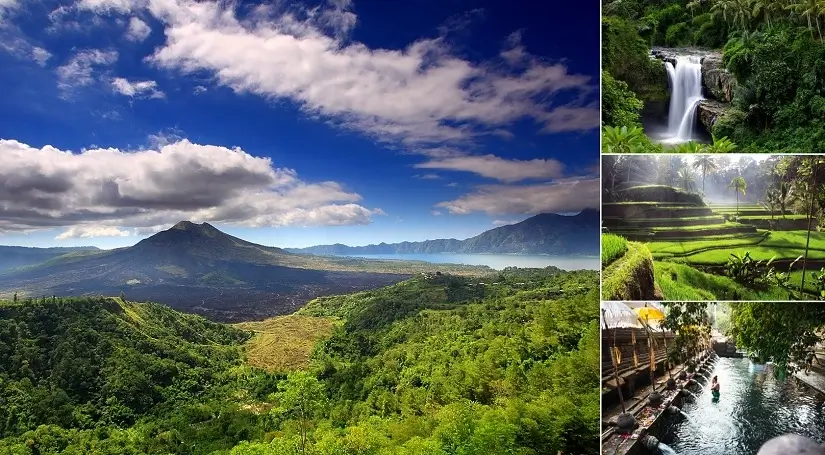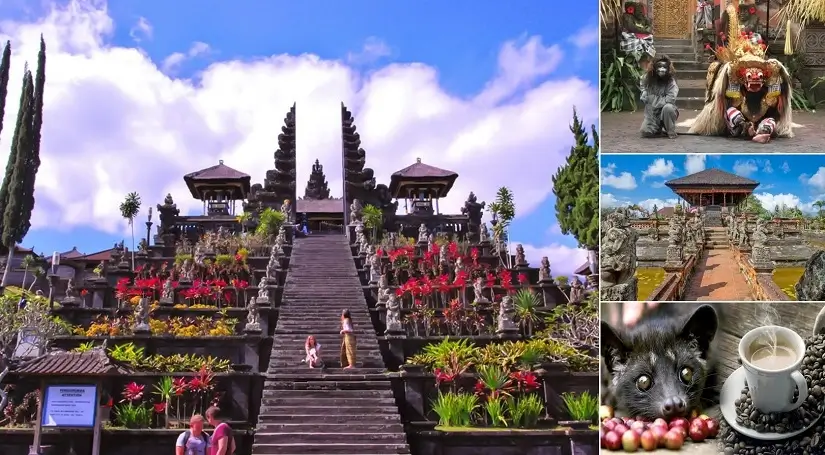Barong Dance Bali is one of the Balinese dances and the story about fighting between bad and good character ( bad spirit is Rangda and Good Spirit is Barong )
Table Of Contents
Barong Dance Bali is One Of The Popular Dance As One Of The Most Famous Tourist Attractions
Everything You Need To Know About Barong Dance Bali Performance ( Barong and Keris Dance)
Barong is a character in the mythology of Bali. He is the king of the spirits, leader of the hosts of good, and enemy of Rangda in the mythological traditions of Bali. Banas Pati Rajah is the fourth brother or spirit child that accompanies a child throughout life. Banas Pati Rajah is the spirit which animates Barong. A protector spirit, he is often represented by a lion, and traditional performances of his struggles against Rangda are popular parts of Balinese culture. The Barong Dance Bali is often portraited with two monkeys
The Barong is the magical protector of Balinese villages. As & lord of the forest with fantastic fanged mask and long mane, he is the opponent of Rangda the witch, who rules over the spirits of darkness, in the never ending fight between good and evil. During the Galungan Kuningan festivals, the Barong (there are many types, including barong ket, barong macan, and barong bangkal) wanders from door to door (nglawang) cleansing the territory of evil influences.
Like the kecak dance bali, the Barong Dance Bali is a battle between good and evil spirit. Barong can take various forms but in this dance he takes the form of the dance Barong Keket, the most holy of the Barongs. The Barong Keket is a strange creature, half shaggy dog, half lion and is played by two men in much the same way as a circus clown-horse. His opponent is the witch Rangda.
Story of Barong Dance Bali
The fight between Barong and Rangda is also the topic of traditional narratives, usually performed in the temple of the dead. The most famous is the story of Calonarang, a widow from Jirah who is furious because she cannot find a suitable husband for her daughter Ratna Manggali.
All the eligible young men are scared of her black magic, so she gets revenge by wreaking havoc over the kingdom of Daha. The king, Erlangga, tries to punish her, but all his attempts fail. She kills all the soldiers he sends to destroy her.
Then Rangda decides to destroy Daha. She summons all her disciples and in the still of night they go to the Setra Gendrainayu cemetery, to present offerings of dead flesh to Durga, the goddess of death. Durga agrees to the destruction, although she warns the witch not to enter the city of Daha. But the witch does not heed Durga’s advice and the kingdom is soon hit by grubug (a plague) and the villages quickly become cemeteries, people dying even before they can bury their dead.
Corpses are scattered everywhere and the stench is unbearable.The only person who can defeat the witch is Mpu Bharadah. At the king’s request, Bharadah sends his disciple Bahula to steal Calonarang’s magic weapon Bahula pretends to ask for Ratna Manggali’s hand in marriage, and while the witch is away, Bahula steals the magic weapon with the help of Ratna Manggali.
Then he gives the stolen weapon to his teacher Bharadah. The weapon turns out to be a manuscript containing the key to ultimate release (mokswhich has been used upside-down by Calonarang. Bharadah goes to Daha to challenge the witch. With the help of the Barong, she is defeated. Before being killed, she asks to be released from her curse and purified.
The story goes that Rangda, the mother of Erlangga, the King of Bali in the tenth century, was condemned by Erlangga’s father because she practiced black magic. After she became a widow, she summoned all the evil spirits in the jungle, the leaks and the demons, to come after Erlangga. A fight occurred, but she and her black magic troops were too strong that Erlangga had to ask for the help of Barong.
Barong came with Erlangga’s soldiers, and fight ensued. Rangda casted a spell that made Erlangga soldiers all wanted to kill themselves, pointing their poisoned keris into their own stomachs and chests. Barong casted a spell that turned their body resistant to the sharp keris. At the end, Barong won, and Rangda ran away.
Somebody can die or get seriously injured in a Barong dance. It is said that if Rangda’s spell is too strong, a weak soldier may not be able to resist it, even with the help of Barong. He may end up hurting himself with his own keris. The masks of Barong and Rangda are considered sacred items, and before they are brought out, a priest must be present to offer blessings by sprinkling them with holy water taken from Mount Agung, and offerrings must be presented.
Barong Dance Bali is one of the distinctive arts community of Bali, where Barong it self is symbolic of goodness with shape like a lion. in Barong dance it tells the story about battle between Barong and Rangda, Rangda is a symbolic of badness with shape like a giant with a big canine. Both of them is a reflection of human action in daily life with the good and bad behavior, or in Balinese it’s call Dharma and Adharma.
Barong is like a doll which being moved by person inside it, Barong is very heavy, this dance usually performed by two big mans that lift and moving the barong from the inside. The story goes that Rangda, the mother of Erlangga, the King of Bali in the tenth century, was condemned by Erlangga’s father because she practiced black magic.
After she became a widow, she summoned all the evil spirits in the jungle, the leaks and the demons, to come after Erlangga. A fight occurred, but she and her black magic troops were too strong that Erlangga had to ask for the help of Barong.
Barong came with Erlangga’s soldiers, and fight ensued. Rangda casted a spell that made Erlangga soldiers all wanted to kill themselves, pointing their poisoned keris into their own stomachs and chests. Barong casted a spell that turned their body resistant to the sharp keris. At the end, Barong won, and Rangda ran away.
Barong is probably the most well known dance. It is also another story telling dance, narrating the fight between good and evil. The Barong Dance Bali is the classic example of Balinese way of acting out mythology, resulting in myth and history being blended into one reality.
Related Bali Tour Package To Visit Barong Dance Performance

DENPASAR CITY TOUR

FULL DAY UBUD TOUR

KINTAMANI TOUR

BESAKIH TOUR

UBUD & KINTAMANI TOUR






